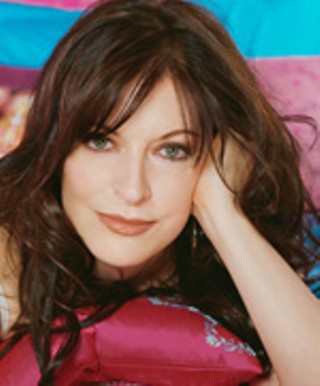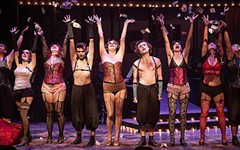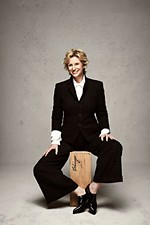In the Moment
Ann Hampton Callaway takes things 'Slow' but is more alive live than ever
By Robert Faires, Fri., Dec. 17, 2004

But while "slow" may be Callaway's new credo (and her new CD's title), it doesn't mean she's any less lively in performance. On the contrary, she's adapted one of her signature concert bits – improvising a song from audience suggestions – into a more ambitious exercise – improvising a song based on an audience member's life – that proves her more alive than ever. She spoke to the Chronicle in anticipation of her third visit to town with Austin Cabaret Theatre.
Austin Chronicle: Im intrigued by this idea of this being your version of a make-out album. It got me wondering, What is the state of the make-out album in 2004?AHC: There aren't that many people making quote-unquote make-out albums, and I think in these crazy times we need more refuges. We need more musical oases, because the world just keeps spinning and getting more crazy, and I think it's essential to slow down from time to time and submerge yourself in something beautiful and something that helps you get in touch with your heart. Otherwise, it's very easy to become alienated from yourself and other people. One of the things that became apparent, the reason that I wanted to make the CD, is I recognize the need for that in my life. I think if it's happening in my life, it must be happening in other people's lives as well.
AC: Were there particular albums that stand out as the make-out albums of your youth?
AHC: Oh, my
youth. Well, I'm too embarrassed to say my favorite make-out albums of my youth. I really don't want to go public on that. But my favorite adult make-out album is Shirley Horn's Here's to Life. Every song is so gorgeous and delicious and beautiful and soulful. I also love John Coltrane and Johnny Hartman. That's a great make-out album. I have very sophisticated make-out album tastes. Some people like boom-shaka-laka-laka, boom-boom. That's not my taste.
AC: Your tastes are much more classic and timeless than mine were.
AHC: Well, what was your favorite make-out album?
AC: John Klemmer's Touch. I don't know if anyone remembers John Klemmer anymore. He was a saxophone player in the Seventies. What was then kind of soft jazz. And every cut was slow and cozy, and you could put it on and know that the mood wasn't going to be broken for the next 40 minutes. Or 20 minutes, since in those days, you had to flip the album over.
AHC: Right, and 20 minutes about did it when you were an adolescent anyway. [Laughs] There should be an article about good make-out albums, because there aren't that many albums that do create that seamless mood.
AC: Did you know where you wanted to go with the album, what music you wanted?
AHC: I knew that I wanted it to be a celebration of my love. I've been in a wonderful relationship for a year and nine months. I've been so happy, and I really wanted to celebrate that and just sing delicious, beautiful songs. And I'd been writing a lot of songs in honor of my relationship, so I knew I wanted to include some of those songs. But when I had this epiphany with the word slow after this hellacious trip to Virgin Records, it was just a gift from God. It's funny how so many of my favorite experiences in music feel like gifts. They're not necessarily things I consciously discover. They sort of come to me. And who knows what that process really is? I felt it was time to explore some newer standards. On Will You Still Love Me Tomorrow, I made such a discovery for myself. I found depth in that song that I never dreamed that I would. Carole King, when she was hearing it in the studio, was just weeping. She was very surprised at what I found in it. It's a fun challenge to try and create something fresh and new with things that are traditionally pop songs. It's interesting. One of the things that I've noticed in the feedback of my live performances that feature a lot of theSlow material is people saying that they're hearing these words for the first time, or they feel like they're hearing these words for the first time. I think that pop singing tends to be more about music and a sound than about lyrics, and the discipline and style of music I sing –- for pop songs that are well-written, it's a wonderful style because they're going to get a lot more lyric reading, they're going to get more subtlety, and the emotional exploration is going to be deeper. Songwriters should look forward to having more of us singing these songs. There are a lot of really wonderful [pop] chestnuts that deserve more attention than they got in the first place. AC: Has this new approach changed your live performance work at all?
AHC: Obviously, I can't do a whole evening of ballads, so I haven't been doing only material from
Slow, but I have been doing romantically themed shows. One of the things that's changed in my show is that I'm now doing improvisations where I'm inviting people up on stage to interview them and get a portrait of them, and then I write a song based on what they say. It's been an incredibly powerful experience. For instance, Fran Drescher came up in L.A., the last show there, and she talked about what she was looking for in love. And some of the things she said were very funny, and some of them were very poignant, since she just survived cancer, so the song that came out of that was so much deeper and more powerful than a let's write an L.A. love song. So I'm trying to get a little more daring with how much substance I put in these songs. I'm still having a lot of fun and being spontaneous and playful, but I'm trying to really share who I am today. I think that's one of my hopes as I perform: This is who I am right now. AC: Are you content to let these songs appear once and fly away, or are you recording the shows so you can have some record of them?
AHC: That's a very interesting subject. Everybody I know is saying, Why aren't you recording these things? They're too special to let go. I wrote a song once that I've never performed called Painting in the Rain. You know those people on the sidewalks and they do those incredible chalk paintings based on Renaissance paintings and then it rains and they're gone? When I offer to do something in the moment, if you know you can hear it again, you're not going to listen with as much attention. If you know that this is the only time you're going to hear this, there's a deeper sense of Oh my god, this is it. Or at least I hope there is. However, it's really ridiculous that I don't have these things recorded. Because some of my greatest writing, some of my most surprising inventions have come from this way of singing and writing. In L.A., all of my songs were recorded, and I'm so glad because they're really special. And if I want to, I can go back and edit them and turn them into songs that will last. But the other thing I want to do is an entire performance of improv, because I think people think, Oh, this is just a little trick. But to me it is just an amazing, mystical experience. I'd love to do a whole CD of it, but I don't know what record company would let me do that. I think I'm one of the only people in music who's doing this, and I think it's exciting.
AC: There's a sense of tapping into some level of your own creativity that isn't always easy to do when you're performing familiar material.
AHC: You know, one of the things I feel about doing it in this time is that when people go out, there are so many things they can do with their time, and if they go to hear a live performer, it should really be live. So much of what is in our society and is getting heard and what is getting played is so produced and so thought-out and so airbrushed, and so many of the singers who are famous and making millions of dollars don't even sing. They're all pitch-corrected and edited within an inch of their lives. There's not a lot of from-the-heart, immediate, spontaneous communication going on. That's why I think the more daring and in-the-moment my performances are, the more they address a time that is becoming less [spontaneous]. It's like wanting to have wild strawberries as opposed to those perfect-looking strawberries that look so beautiful and have no taste.
Ann Hampton Callway performs Friday, Dec. 17, and Saturday, Dec. 18, 8:30pm, at the Mary Moody Northen Theatre at St. Edward's University, 2901 S. Congress. For more information, call 453-2287 or visit www.austincabaret.org.










